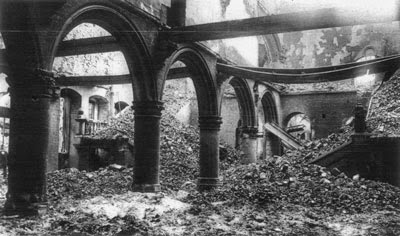On August 19, 1914, the advancing German armies that had grievously violated Belgian neutrality earlier in the month, occupied the city of Louvain (Leuven), Brabant.
Six days later, on August 25, 1914, the occupying forces exacted their revenge on the civilian population (the reasons are unclear to this day, it is often thought that they believed the civilians to be enablers of franc-tireurs). Many civilians were massacred (Cardinal Mercier would mention 176 in the city and surrounding areas in his pastoral letter of Christmas 1914), much of the city was sacked, and the university halls were badly damaged. On that day, the greatest library in Belgium and a treasure of Catholic civilization, the Library of the original Catholic University of Louvain (Leuven), Flanders, was destroyed by the German army.
The Church of St-Pierre [Saint Peter] was methodically set on fire, as was the University Library. A Josephite Father called the attention of the officer in command of the incendiaries to the fact that the building which he was about to set on fire was the Library. The officer replied, "Es ist Befehl" (It is ordered). It was then about 11 p.m. on Tuesday, August 25th. [Judicial report on Sacking of Louvain]
300,000 books, 1,000 ancient manuscripts, and 800 medieval incunables were entirely lost -- and a number of works were permanently damaged.
The largest of all massacres in deeply Catholic Belgium took place in and around Dinant, very close to the cherished abbeys of Maredsous (monks) and Maredret (nuns): 674 civilians were slaughtered by the German occupying forces in the city on August 23, 1914. The grave events of the following decades cannot efface the memory of the 1914 atrocities committed against Belgian civilians.
***
In 1921, the sisters of Maredret, so closely touched by the atrocities, illustrated with illuminations and printed a special version of the Cardinal's 1914 Pastoral Letter: a veritable jewel of 20th-century graphic art and printing.
 |
| Page with the illumination of the destruction of Louvain and its library |
Pope Saint Pius X, who had created Mercier Cardinal in 1907, was in agony on that day of the occupation of Louvain. In the early hours of the next day, the day of the fall of Brussels, as hundreds of soldiers and civilian victims in Flanders, Wallonia, Alsace, Serbia, East Prussia, and Russian Poland, the Pope died in the Apostolic Palace. He died with Christian Civilization.

